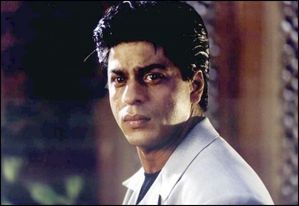Love in Kuch kuch hota hai
Publié le 30 Septembre 2010
Hi, I've found this text written a long time ago probably after having seen KKHH one of the first times! Enjoy!
Where does the poignancy of love come from? This love in need of love, this need which screams in the face of the loved one “I will make you happy!”, this tearing of the future when love isn’t fulfilled? The movie rapturously delays the moment of relief, which should be its dominant feature, that of the Happy end, and yet what remains with me is the sorrow, the pain of love when it is offered and unrequited, its naked beauty and its violent softness. This is what characterises Rahul and Anjali’s story. She has loved him from the start; for her, he’s the one. She’s his friend, and a friend stays a friend for always. This “always” is love’s surest guarantee. Without friendship, what’s love? Passion, desire. But friendship is the soul of love, its lasting heart, its tenderness, its modesty. So why the distress, why the reluctance to end the wait, why the little lack of something missing?
If friendship between man and woman cannot reach love, it is amputated, it is forlorn and separated from its purpose. Friendship wants the other person’s well-being, but in the case of an obstacle it hides and flees; it leaves love alone if love won’t accept it. It sacrifices itself because friendship’s love is wiser and humbler than the burning love of eyes and bodies. Friendship becomes love only when united with love; left alone, it becomes a faith, a hope, and won’t reveal the love which lies at its core. But when love comes in its direction, it can hardly believe in it: it’s stunned and disarmed. Can divine love have decided to land close to it, and touch it? Will friendship, little and quiet friendship, become the partner of all-powerful, divine Love? Is such a thing possible?
You are my love, says the lover – I am your friend, says the friend: strange it is (it seems to me the film shows that?) that women are perhaps more on the side of friendship, while men are more lovers. Women like what men disdain; they are friends of who men will be, long before they know it, whereas men tend to love only she who is there before them. Who knows whether he will still love who she will be, and whom he can’t see, even though she’s here, right under his very eyes? But she knows that, and is ready for it. She also loves this unreasonable blind love of the present, childish and immature as it is.
Womanly friendship, soft palm on my cheek, do not move, stay with me, blessed are you to have seen in me that invisible future! Help me to conquer the deceiving present, for you are here now, your presence fills me with a freedom that defines me and delights me.
“All who have parted once must meet,
First we live, and last forget” (Kathleen Raine)
The movie insists on “first love” – one doesn’t love twice, it says, even if life tells us and shows us the contrary. Thus is made clear that life is somehow greater than love – it’s its main ingredient. Upon meeting Rahul again Anjali asks: “You aren’t ill, I hope?”, and he says: How pretty you are”. Life is love’s fundamental basis. But it’s more than love. It’s also reality, humdrum and ordinary. It’s living creatures’ autonomous impulsion, it’s insensitive, and selfish too. What is “first love”? Why is it so often equated to “one and only love”? Our first love is both the child of chance and necessity, both placed in time and steeped in eternity, it is creation, construction, it defines who we are. It refuses to be the “first” time, it is always, it has ever been, like life itself. It wants to be love itself, friendship itself, essential union and agreement of what was before separated; it is the common echo of two beings who have pronounced this word “love” to one another: for them love will have had this echo forever. Once all this has been thrust in the mind, in the eyes, this once is the last because it is the first and the only one. Life can of course build again such a monument, but nothing will replace in the memory the virginity of this first meeting and first eternity.

This is why morality asks lovers to wait and contain their desire: so that their love, their mutual attraction, becomes a lasting friendship, built in their heart with the white stones of trust. If their love contains such a friendship, then all is good. But would they know it if, rushing past their virginity, they leave the stones in the quarry, and build nothing lasting? If desire alone replaces bond and future, aren’t they fleeing time and themselves? Friendship is precious in that it builds love on a common virginity of the heart, a common eternity. From its origin, love will have been the waiting and the needing. Without the friendship for the person who shared this time of wonder, this time of first steps, of games and projects and hope, how will love resist another attraction, that will promise the same as the first one?

So one understands how petrified friendship can be, when it meets with love, when it sees love coming its way (an almost married Kajol facing Rahul on the balcony): it’s like a simple human watching God recreating him anew, and perhaps making him die in the process. The fear and the hope, the burning ice, banal clichés indeed, are nevertheless the truth of a love that contains friendship at its core. This is why I remember more the moments before the fulfilment, than the fulfilment itself. The two lovers’ reunion in the end is less important than their long wait, their hope and their faith. Indeed something breaks when they finally reach the happiness they had been waiting for for so long, something which was their strength and their virtue, and won’t be needed any more. This something is the mild friendship that bound them in its purity and its love. Now that the distance has vanished, this familiar friendship must leave on tiptoe, before it can come back, much later, after the years when love starts cooling. The triumph of true love always contains a little twinge, the faint misery of lost friendship.
/image%2F1489169%2F20200220%2Fob_9722d6_banner-11.JPG)